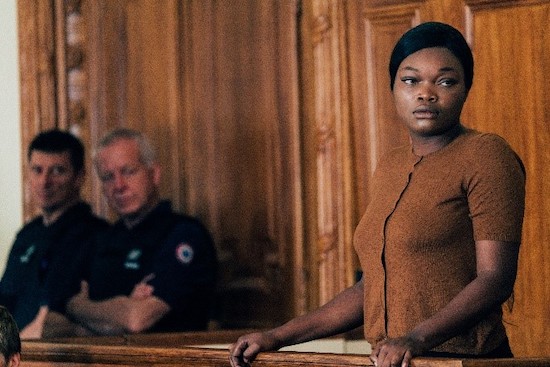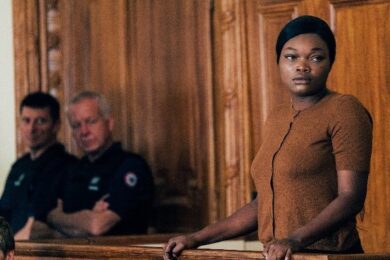"Nothing makes sense in this story.” Those words, spoken by Fabienne Kabou as she stood trial for leaving her infant child to drown in the surf at French resort Berck-sur-Mer, act as a haunting synopsis for the media furore that surrounded her case.
The story made little sense to the prosecution, who mocked Kabou’s claims that her actions were the result of sorcery. Nor did it make sense to the Western press, fixated on the perceived incongruity between Kabou’s eloquent French and her status as a Black immigrant from Senegal. Even Kabou’s own lawyer described Kabou as having “remarkable intelligence”, revealing her ingrained prejudices around Blackness. In what other case of infanticide would media outlets make a point of mentioning the culprit’s “well above average” IQ?
For Alice Diop, a French documentary filmmaker who witnessed the trial first-hand, Kabou’s story and its contradictions proved stirring enough to inspire her first narrative feature Saint Omer. Diop made her name with a series of intimate non-fiction films that predominantly depict the lives of people of colour in modern France, whether chronicling a Black male actor fighting against typecasting in 2011’s Danton’s Death or the countless migrants that attend Avicenne Hospital in On Call from 2016.
2013, the year that Kabou murdered her child, was also the year that France removed the word “race” from all its legislation, an act of nominal colourblind progressivism that instead underlined a wider unwillingness to tackle entrenched racism. With Saint Omer, Diop once again interrogates the French cultural hegemony and its persistent persecution of Black women, while foregrounding her own reaction to the trial through an author insert, Rama (Kayije Kagame).
The crux of Saint Omer isn’t about whether or not Laurence Coly (a direct analogue for Kabou, played by Guslagie Malanda) left her child, Lili, to drown. In fact, Coly admits to the crime before she’s even seen on screen. More than that, Diop reckons with the socially-coded pressures and mental health issues Coly faced, while asking a more pertinent question: what drove Coly to kill her child?
Diop’s approach to the material is disarming in its simplicity. Collaborating with cinematographer Claire Mathon, the pair shot the trial chronologically, preferring long takes that enabled the actors to inhabit their roles more fully. Diop never called action or cut, in an attempt to capture an emotional truth to the proceedings. In itself, this direction offers an antidote to the biases of traditional media reporting, edited into bitesize samples that fixate only on headline-grabbing moments.
Although the majority of Saint Omer takes place during Coly’s trial in the titular town, the initial focus is on Rama during her day-to-day life in Paris. We learn that Rama, a successful author, is attending Coly’s court case in preparation for her next project, a novel that will draw parallels between Coly and the Greek tragedy Medea, whose titular character takes revenge on her adulterous husband by murdering his new beau and her own two children. When Rama is questioned by her literary agent as to whether the proposed title “Medea Castaway” will make sense to audiences, Diop plays Rama’s incredulous response for dry humour—a self-aware jab at the disconnect between the Western canon and the wider world. It’s telling that her publishers prefer a title that directly references the trial. Already, a Black woman’s trauma is primed for exploitation.
As soon as the trial is underway, however, Rama’s artistic remove begins to crumble—not least because she is pregnant herself. Seeing the pain Coly has gone through, both as a young Black woman and a mother, quickly disperses her attempts at intellectualisation. From the minute Coly appears, shuffling in handcuffs, she is questioned on the basis of her upbringing, her culture, and her Blackness, implicitly compared against a received understanding of how a Black woman should exist—an existence Rama feels interrogated on too. In Western media, three stereotypes of Black women recur most frequently: that they are primarily caregivers, that they are hot-tempered, and that they are sexually lascivious. What they are not is educated. During Coly’s time in court, each of those embedded tropes is challenged.
Beyond all her other transgressions, what most aggravates the court is Coly’s betrayal of her preordained role as caregiver. The irony is that those same social expectations drove Coly to her breaking point. Certainly, Lili’s father, Luc Dumontet (Xavier Maly), had expectations of how Coly should behave, hiding her from his family out of shame because of her age (27 years his junior) or her race or, most likely, both. Their living arrangement, at times, sounds more like that of a master and maid, as Coly observes, “I wasn’t invited to his daughter’s wedding, but he did ask me to cook the meal.” For his part, Dumontet plays the doting husband and father in court. But all evidence points to the contrary; he repeatedly questioned Lili’s parentage, made no adjustments to his lifestyle for his new family, and didn’t attend Lili’s funeral. In one key moment, Coly’s eye twitches during Dumontet’s testimony that he loved her and Lili – a rare crack in her otherwise inscrutable impassivity. Diop lingers long on this subtle reaction, emphasising the isolation Coly faced as an essentially single parent.
That twitching further highlights the repression Coly has undergone as a result of her upbringing, where the worst thing a Black woman could be is perceived as impolite. We learn how Coly’s mother Odile Diata (Salimata Kamate) forbade her from speaking Wolof and pushed her to only speak in perfect literary French, inadvertently ostracising her from her community in Dakar. When Rama and Diata connect during a break in proceedings—recognising a shared Senegalese heritage wordlessly amongst the predominantly white courtroom—Diata gushes over the press coverage and its obsession with Coly’s educated manner and well-kept appearance: “It’s incredible.” Her only consternations surround Coly’s tone, worrying to Rama that Coly was too rude to the prosecuting attorney (Robert Canterella). In Coly’s mother, we see the inculcation of Western media, where a Black woman must assimilate silently to succeed.
Finally, Coly is presented as a narcissistic seductress by the prosecution. Rather than viewing it as a failure of the system that a woman was driven to drown her child out of desperation, instead Coly is framed as a master planner who used sex to manipulate Dumontet into a cosy living situation. The fact that she didn’t call her errant husband as she was giving birth? Rather than demonstrating the abuse she’d suffered at the hands of her neglectful jailor, the prosecution positions this as the first sign she intended to kill her baby. Lili’s unregistered birth? Not indicative of disenfranchisement with her adopted country, but another step toward murder.
What is not addressed until the very end of the trial, however, is Coly’s mental health. Instead, both the judge and the prosecution attribute Coly’s talk of witchcraft to her culture—early in the trial the judge states, “Although you claim to have Western values, you describe ‘hallucinatory’ phenomena.” Instead of questioning the mental health implications of such hallucinations, Coly’s narrative around witchcraft is brought into conflict with the Western value system, othering her struggles. Looking to British shores, 2021 rates of detention under the Mental Health Act for Black or Black British people were over four times those of the white people, a jarring reminder of the consequences of unaddressed mental health crises. In Kabou’s case, the court psychiatrist said her act was possibly triggered by post-natal depression, and that’s the same conclusion Diop seems to draw, ending the trial on a speech from Coly’s defence attorney Vaudenay (Aurélia Petit) that states that imprisoning Coly would be “condemning her to madness.”
It’s this final speech that acts as the lynchpin for Diop’s discursive frustrations with the French cultural hegemony (and the white patriarchy as a whole), standing out as one of the few parts of the script that’s invented rather than taken from the trial and its transcripts. In it, Vaudenay emphasises that dismissing Coly as a monster is the easy way out—a reductive answer to a story that’s far more complicated. It’s one of the few times Diop and Mathon shoot a subject head-on, ensuring Vaudenay is addressing the audience as much as the court. As the speech continues, Diop cuts to a series of otherwise silent women in the courtroom, each weeping, each struck by the tragic fate of Coly and Lili. Through the impact of each successive shot, the filmmaker underlines the universal aspects of Coly’s (and therefore Kabou’s) story that were lost in the media’s attempts to other her. One suspects that those watching clips from Kabou’s trial on the news at home failed to have the same empathetic response.
Saint Omer is out in UK cinemas now



